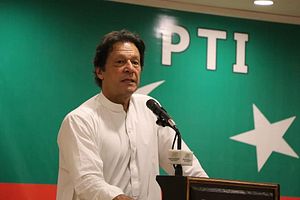Throughout his campaigns over the years, Imran Khan, now Pakistan’s prime minister, has always commented on his intention to carry out an intensive anti-corruption drive once in power. Pledging “strict accountability” and a crackdown against “the people who looted this country,” Khan visualized an extensive anti-corruption campaign. Finally, with his recent election, the time seems to have arrived, as unprecedented measures are being taken along with the announcement of a new “whistleblower law” to help end financial crimes.
For starters, an Assets Recovery Unit (ARU) has been established with its headquarters based in the prime minister’s office in Islamabad to retrieve monies or hidden assets overseas. Comprised of bank officials as well as representatives from all the government intelligence agencies, this unit aims to target high-level corruption in the initial phase. Getting details of illegal foreign bank accounts within the country, the ARU has special powers to access any kind of information from any department within seven days. Although it is not possible to gauge the exact amount of stolen wealth or aggregate value of ill-gotten overseas properties at this point, the unit will likely present more precise projections in the coming months.
Second, a law to facilitate and reward whistleblowers has been unveiled recently. Addressing a press conference in Lahore, Khan outlined the new incentive, saying, “The law will invite countrymen to identify the corrupt and [whistleblowers will] get 20 percent of the ill-gotten money and assets recovered from such people.” The award of 20 percent from ill-gotten stashes of wealth is aimed at actively motivating close business partners, associates, or employees of powerful kingpins to alert the authorities of financial wrongdoing.
Ostensibly, the remainder (80 percent) of the recovered funds would be used to ease Pakistan’s balance of payments crisis as well as its debts. Recovering funds as quickly as possible is a dire need for the cash-strapped government. In the coming days, a draft of the new law is likely to be presented before parliament for passage as a bill and further stipulations would be added to protect whistleblowers to increase their confidence in coming forward.
As Pakistan’s financial crisis gets worse, the government constantly highlights that rampant, uncontrolled corruption from the highest to the lowest tiers of society and government is a key factor responsible for its predicament. Trying to regain the confidence of foreign investors and business partners alike, the fledgling government has had to find new methods and exert all its resources to get back stolen funds. In the meantime, Pakistan’s budget deficit climbs and foreign exchange reserves are depleting fast. Staving off a balance of payments crisis requires a bailout from the International Monetary Fund (IMF) as all other options have failed.
The Pakistani government has request help from various foreign governments in recovering corruption proceeds. Agreeing to cooperate, the British Home Secretary Sajid Javid recently announced a joint declaration along with the Pakistani law minister. Titled “U.K.-Pakistan Justice and Accountability Partnership,” it enumerates that both governments would track corruption and restart a bilateral prisoner transfer process so that the corrupt can brought back to face the courts in Pakistan. Khan has also requested the UAE to help identify Pakistanis who have acquired properties worth billions of dollars in the Emirates and hastened the signing of a bilateral treaty with Switzerland for the exchange of information. Taking fast-track measures to retrieve nearly $2 billion that has been traced overseas by various culprits, details of over 10,000 properties in England and Dubai have also been compiled.
It is hoped that drastic measures — slightly reminiscent of China’s Skynet operations against corrupt citizens hiding abroad — will give effective results. In fact, keen to learn from the Chinese experience in rooting out corruption, Khan even requested advice from China’s Premier Li Keqiang on battling corruption in their very first communication after the election.
In the long run, Khan hopes that effectively fighting corruption will speed up national development in Pakistan.
Sabena Siddiqi is a foreign affairs journalist and geopolitical analyst with special focus on the Belt and Road Initiative, CPEC, and South Asia.

































